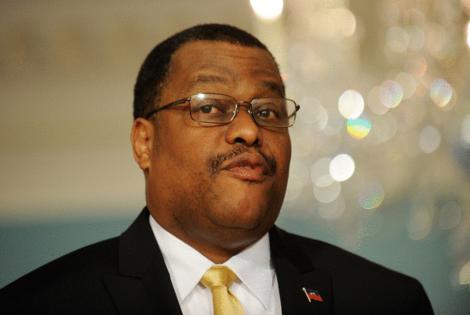Gang massacre in Haiti town raises questions about effectiveness of international force
Published in News & Features
At least 70 Haitians are dead and dozens of others are unaccounted for following a massacre in a farming community involving one of Haiti’s most ruthless armed groups.
The surprise attack happened in the early morning hours Thursday in Pont-Sondé, whose residents had been trying to defend themselves against the Gran Grif gang. It is raising questions about the effectiveness of a Kenya-led international force and the Haitian government to the country’s ongoing violence.
The killing spree unfolded around 3 a.m. Thursday in the country’s breadbasket, the Artibonite region, and came just days after the United Nations and the United States imposed sanctions on the gang’s leader and a former lawmaker accused of forming, supporting and arming the group.
Among those killed were 10 women and three infants, the U.N. said. Another 16 people were seriously injured, including two gang members hit during an exchange of gunfire with Haitian police. The gang, which fired automatic weapons, also set fire to 45 homes and 34 vehicles, forcing thousands of residents to flee to the neighboring city of St. Marc.
“We are horrified,” Thameen Al-Kheetan, a spokesman for the U.N. Human Rights Office, said Friday. “It is crucial that the authorities carry out a prompt and thorough investigation into this attack, hold those responsible to account, and guarantee reparations for the victims and their families.”
The massacre in Pont-Sondé is the worst in terms of casualties since foreign police officers began arriving in Haiti in late June. The brutal attack highlighted the shortcomings of international efforts to restore security in Haiti, where 380 Kenyan police officers, two dozen Jamaican troops and cops and two soldiers from Belize are leading a U.S.-backed security support mission.
“Whether it’s the government or the international community, they are putting a lot of energy into doing propaganda than to really work,” said Rosy Auguste Ducéna, manager of the Human Rights Defense Network in Port-au-Prince. “Even in the capital where they have been saying there’s been progress, they haven’t done anything to stop the bandits from attacking. They still have all of their means to attack. No gangs have been dismantled and nothing’s been done to say they have control of the situation.”
Ducéna said Pont-Sondé residents were trying to get back into areas that had come under attack, and that her organization was working on tallying the deaths and destruction. Even without a final count, Ducéna said, the number of people killed surpassed the number killed in other gang attacks since the arrival of the first contingent of 200 Kenyan police officers.
Bertide Horace, a businesswoman and community activist in the Artibonite area, said at least 89 people are still unaccounted for. She said town residents discovered 29 bodies inside homes shortly after the first police units arrived from nearby Verrettes and St. Marc some time after 7 a.m. Thursday. As residents scouted the destruction, they also counted 25 corpses lying in the roadways, many with gunshots to the head. In some cases, entire families had been killed.
Horace said the gang did not encounter any resistance even though there are 23 police officers assigned to the local police station.
“The police didn’t even fire a single shot,” she said. “Though the population was screaming and the sounds of gunfire were heard, the police did nothing. The population was on its own.”
Residents who had spent spent months resisting attacks by the gangs as part of a self-defense brigade could not put up a fight, Horace added.
After the armored police vehicles left, Horace said the gang moved back in and took control again.
Horace said Thursday’s attack was triggered by residents’ efforts to cut off the gangs’ revenues. Anyone using the main roads had to pay a “tax” to the gang, whose members became angry when motorists started taking rural roads to avoid the gang-imposed tolls.
Horace said she and other community leaders in Pont-Sondé pleaded with the Haitian government for additional security forces. They were ignored, she said, leaving the community to band together and try to provide their own support to the police.
“We’ve done all that we can,” she said. “They ignored all of our demands, all of our requests.”
Prime Minister Garry Conille on Friday expressed his condolences, and said there was no justification for the brutal attack. Additional specialized anti-gangs police units, supported by the international security force, have been deployed to Pont-Sondé, he said. He also announced that helicopters will fly in reinforcements.
Conille said the government and the international community are determined to eradicate the gang threat.
On Sept. 27 the U.N. imposed sanctions on Gran Grif leader Luckson Elan and former Haitian lawmaker Prophane Victor.
The massacre triggered outrage inside and outside the rural valley.
“A massacre such as this one is a bold move, one that indicates that the Gran Grif members expect there will be no repercussions to their actions,” said Renata Segura, who oversees programs for Latin America and the Caribbean at the International Crisis Group.
“The awful case raises a number of red flags. First, the fact that the international attention has been squarely placed on Port-au-Prince, which has allowed the gangs to strengthen outside of the capital,” she said. “It also speaks to the incapacity or unwillingness of the national police to stop violence, and highlights the urgency to strengthen the mission’s capabilities.... It also highlights the plight of ordinary Haitians.”
Segura fears that the massacre could trigger a more extreme response from local residents, who may try to get weapons to strengthen their self-defense groups. Horace said young people in the area have already been arming themselves to fight the gangs.
“The government puts them in the position where they now become the judge and jury,” Horace added. “We cannot continue in this situation. The police needs to take responsibility for public security.”
©2024 Miami Herald. Visit miamiherald.com. Distributed by Tribune Content Agency, LLC.







Comments